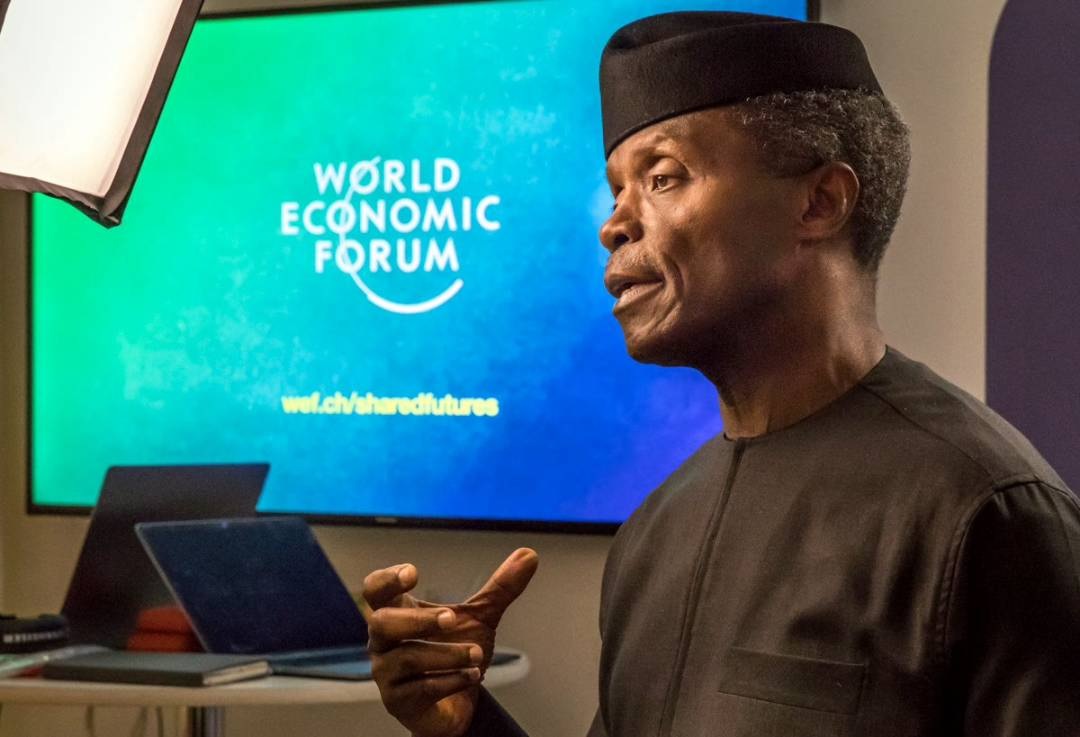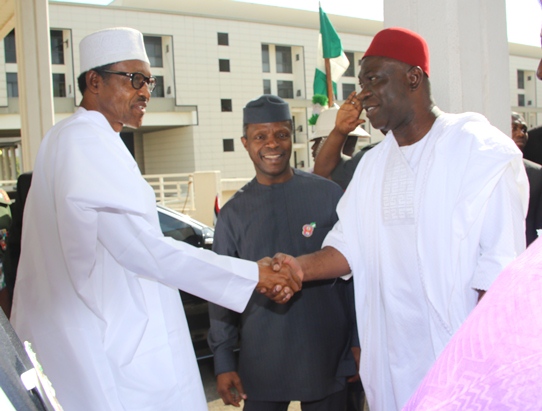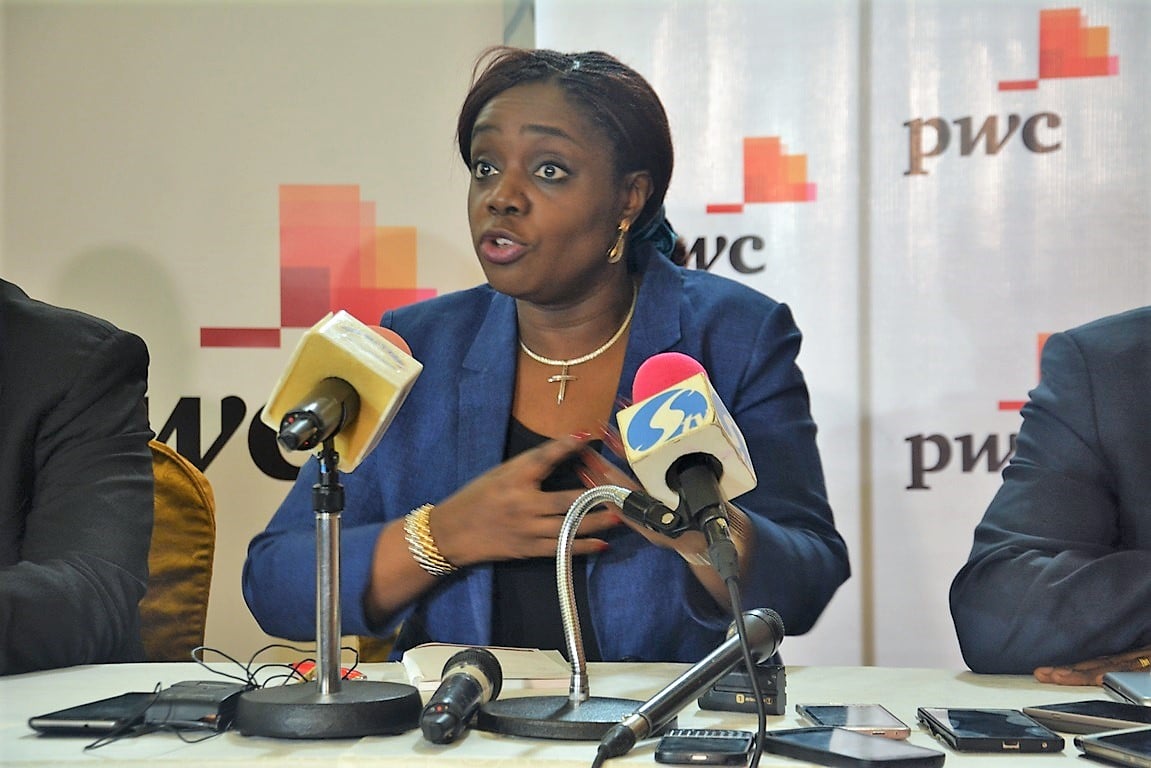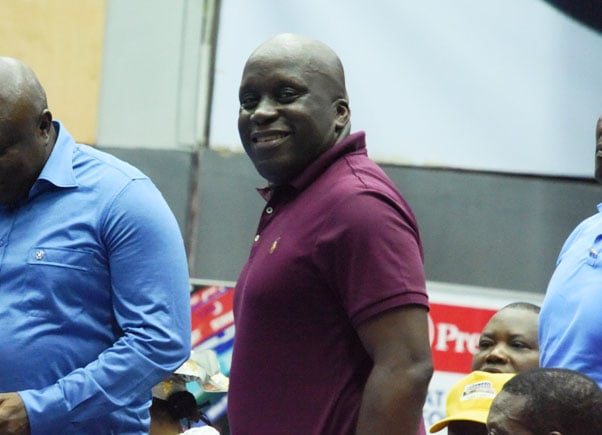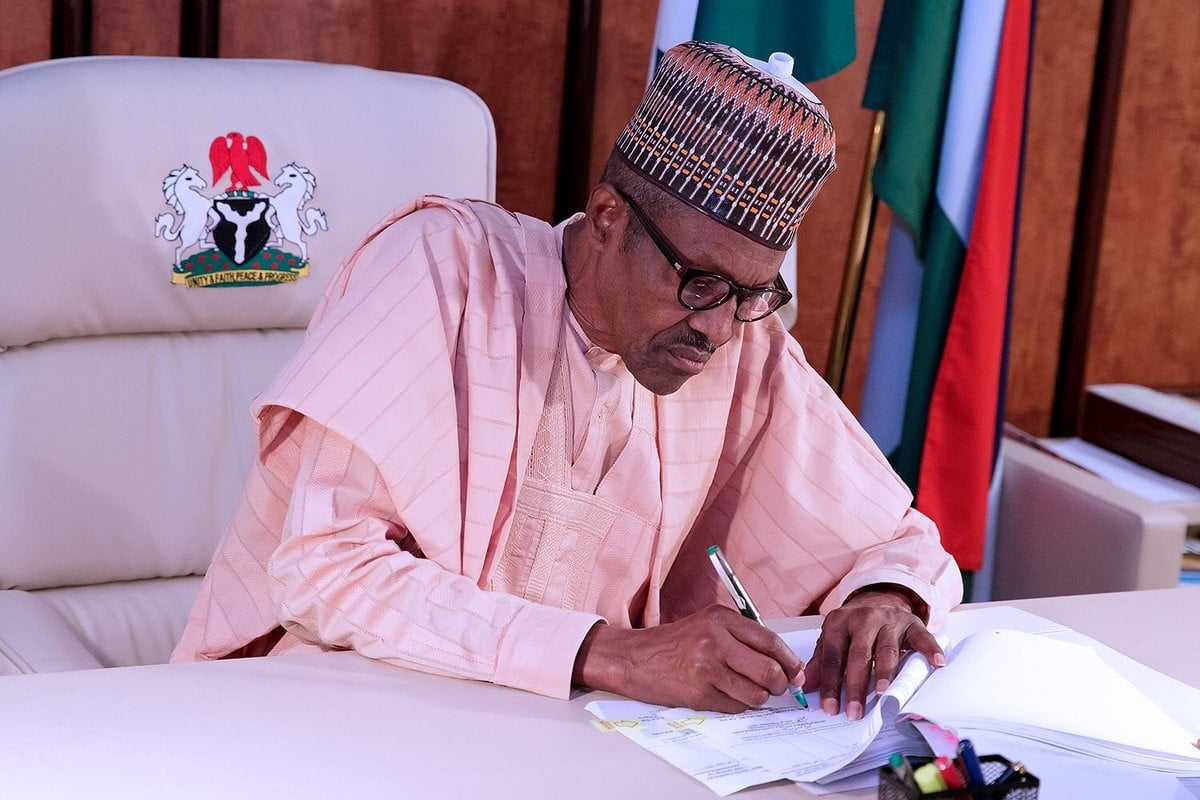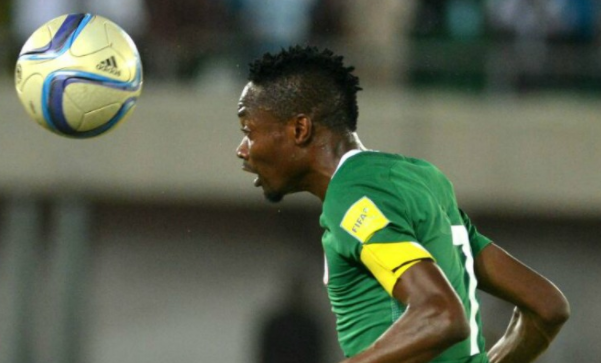Vice president, Yemi Osinbajo records solo video message on theme of WEF 2018, "Shared Future"
Although there are clear indications that President Muhammadu Buhari wants to seek another term, Vice-President Yemi Osinbajo says Buhari’s focus at the moment is one term.
A campaign office of the president has been opened in Ibadan, Oyo state capital, while individuals and groups who have endorsed Buhari’s reelection have been increasing by the day.
On Wednesday, Adebayo Shittu, minister of communications, brought along with him caps of Buhari’s 2019 campaign.
But in an interview with CNBC at the World Economic Forum in Davos, Switzerland, Osinbajo said Buhari is entirely focused on this term.
Advertisement
The nation’s number two citizen added that the president has been working on delivering his campaign promises.
“The president has said that he is entirely focused on this term. He wants to ensure that he’s able to deliver on as many of the promises that have been made,” he said.
“So he’s actually completely focused. In our government, we’re not talking about 2019. We are focused at this point on ensuring that we deliver on our promises. We have a four-year term for now and that’s what we’re focused on and that’s what the president is also focused on.”
Advertisement
Osinbajo also spoke about topical issues ranging from the economy to policies of the current administration.
Below is the interview:
CNBC: The good thing for Nigeria is that you have been listed in the top ten countries of ease of doing business. What difference does that make coming to this conference here in Davos?
Osinbajo: Well I think the major thing is that we have some acknowledgement from the world especially the World Bank that Nigeria is a place that’s open for business and as you said, we were listed in the top ten reforming countries in the ease of doing business so this very good for us and a lot of investors are looking our way on account of the fact that they see positive development in terms of creating a better environment for business. We’ve also recently released our incentive regime a publication which details all of the available incentives across sectors of the economy. It’s a bullish period in terms of attracting business and we are excited.
Advertisement
Speaking about sectors of the economy I know that one of Nigeria’s great dreams is to start growing its own food again after years of importing with oil money. How is that going?
That’s going very well indeed. What we’ve found for example just to take rice as an example: between rice and wheat we were importing almost $3 billion worth of that particular produce but today we are possibly one of the largest growers of paddy rice. Milling is a bit of a problem but we will be self-sufficient in rice production we hope by early 2019. At the moment we are doing exceedingly well. Imports of rice have gone down by as much as 80 per cent and that is one of the major food imports that we have. We are also looking at other areas such as sorghum, millet and all of those areas where there is also a great deal of activity and a great deal of agricultural growth. At the same time agriculture also means more jobs, so many more jobs are being created in the agricultural areas.
CNBC: In these times as well, you’re seeing great buoyancy in the stock market and you’re foreign reserves have also been increasing. How’s that going?
Excellent. Foreign reserves are at $40 billion which is the highest in about 4 or 5 years and we’re also seeing a great deal of progress with respect to investment but this is going very well indeed. We are quite happy with the capital market. It’s been listed as possibly the best performing capital market in the world. We hope to be able to sustain that bullishness in the capital market.
Advertisement
Infrastructure is also a big story as well, particularly in the power front. Are you going to use some of these foreign reserves to help build up Nigeria’s infrastructure? What spending are you planning?
For infrastructure we are doing quite a bit. First with respect to power we are now doing something in the order of between 7000MW and 9000MW. Now, we expect that with improvements in transmission and distribution that will be able to make an impact. At the moment the impact isn’t as wide or as deep as we want it to be. We want the power sector and the consumer to feel that impact and that has a lot to do with the investments in transmission and distribution which we are doing. We want to get to the last mile, to the consumer.
Advertisement
With respect to rail, we’re doing a lot of work in rail. We’re doing the Lagos Kano rail with the new standard gauge. That has already started with the Lagos – Ibadan end of it. We’re investing close to $10 billion, we’re getting some funding from the Chinese with counter part funding from Nigeria. We have already provided counterpart funding and they are providing their own part of that resource. We are also doing the Lagos – Calabar train route which we expect will open up the whole of the Delta are, going up to the South East and the South South regions.
That’s also something we’re doing in the area of infrastructure. Roads are big for us. We’re working very hard on railway and of course power.
Advertisement
CNBC: How much do you plan to increase the investment in places like Lagos which is highly congested as we know?
Well the Lagos State government – as you know we are a federal state, has its own plans. I know they are interested in doing a fourth mainland bridge. I haven’t heard of any new developments in terms of a metro infrastructure at this time but I know that they’re trying to open up new roads especially a fourth mainland bridge which will be a major road route around the city, going into the outlying areas of the city to greater Lagos. I think that that will happen but one of things we’re doing is that in the standard gauge rail we’ll be going through portions of Lagos all down the South West from the port areas.
Advertisement
This is really important especially from the point of view of movement of petroleum products and goods from the port area because the railway actually starts from the Apapa port and then goes out to the outlying areas all through the South West and then up North. That will improve general transport logistics.
And what about social investment spending for the people on the ground in Nigeria?
Since 2016 we’re probably investing in the most ambitious social investment project that the country has ever seen. We’re putting N500 billion in the budget, we did it in the last budget, we’re hoping that we’ll be able to engage 500,000 unemployed graduates. We’ll be able to give micro credit loans, conditional cash transfers also to the poorest of the poor.
So our social investment scheme is really very important. Philosophically for us it’s also a question of not just talking about macro-economic policy. We are concerned about social policy.
Social policy is crucial because we think that in order to achieve the inclusive growth we’ve been talking about we must find a way of accounting for the vast majority of our people who still are in one form of deprivation or the other and that’s why this social investment scheme is extremely important and we hope that we’ll be able to improve on the numbers in terms of the social investment itself and also to see incremental improvements in those who are coming out of poverty.
Last but not least, there’s an election coming up in Nigeria. I understand from my sources that the present President Buhari is going to stand again as president. How do you think the election year is going to play out?
The president has said that he is entirely focused on this term. He wants to ensure that he’s able to deliver on as many of the promises that have been made. So, he’s actually completely focused. In our government we’re not talking about 2019. We are focused at this point on ensuring that we deliver on our promises. We have a four year term for now and that’s what we’re focused on and that’s what the president is also focused on.
Add a comment
